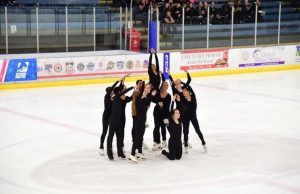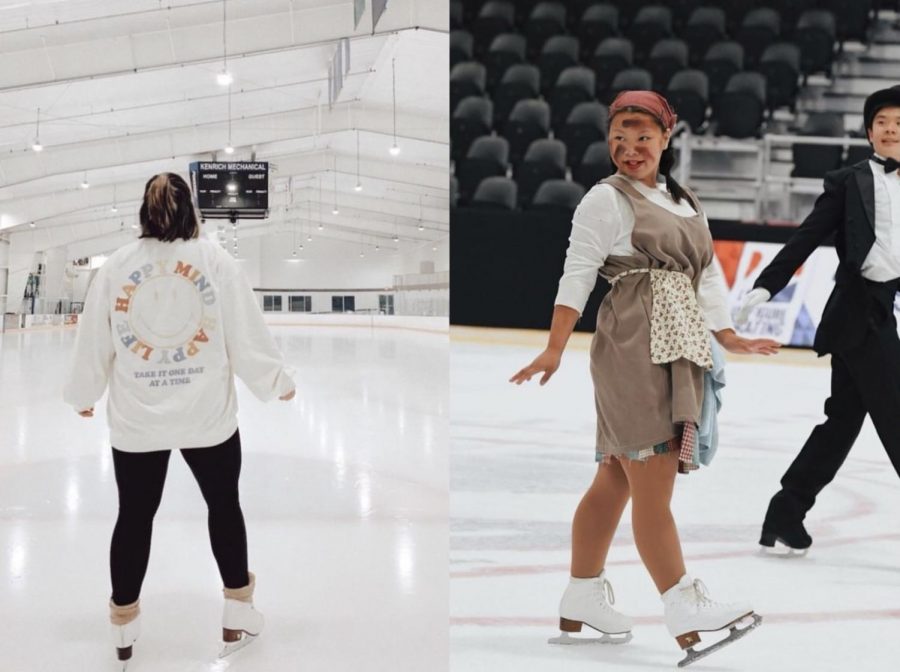No such thing as cold feet for Laine Dubin
Submitted Photos, photo collage by Hannah Nguyen
(Image description from L-R) Practice at Hatfield Ice in January 2021; 2019 Theatre on Ice Nationals – Pelham Civic Complex and Ice Arena.
TOWAMENCIN — “When I’m on the ice, I’m so happy and so blessed to be there every single time. I don’t have to sweat. I don’t have to rely on my other teammates. It’s just me doing the job.”
When I’m on the ice, I’m so happy and so blessed to be there every single time. I don’t have to sweat. I don’t have to rely on my other teammates. It’s just me doing the job.
— Laine Dubin
At 6 years old, Laine Dubin immediately fell in love with skating as soon as she stepped on the ice.
“When I was on the ice, I wasn’t afraid to fall. I wasn’t shaky or anything—how you would expect a really young kid to be on the ice. I was really just kind of taking the rink by storm. It was a very different feeling,” Dubin said.
After that exhilarating experience, she began taking group lessons where she learned basic skating skills. Eventually, she learned to free skate and was taught how to do jumps and spins. After that, she decided to get coaches, one as her main coach and another that helps with jumps and spins, and start competing.
Soon, she joined Theatre on Ice after seeing her friends participate in it, which has the same concept as Disney on Ice. Performances tend to be more open-ended and theatrical and skaters wear special costumes made specifically for the show.
“For theatre, I really enjoy having other people around but also doing something that I love. And then the other thing that I love about theatre is that it’s not like [synchronized skating]. We have a lot more freedom, we don’t have to be like everybody else, we can be our own individual person with our own emotions for whatever character we’re playing,” Dubin expressed. “I think that’s really cool to kind of have that expressive creative outlet. In an individual competition, I enjoy landing jumps and just flying through the air. It just feels amazing.”
Dubin trains between three to four times a week for individual skating and two times a week for Theatre on Ice. Practices can range from an hour to two and a half hours and happen right after school. Depending on who she’s training with for one on one practices, she’ll either work on general skating techniques or specifically jumps and spins. For Theatre on Ice, they’ll run through their programs and adjust accordingly.
She also trains off the ice, which mostly consists of working on jump techniques, spin

positions, agility, and stretching.
Every year, Dubin would normally have 3 competitions for individual skating and nationals for Theatre on Ice, both held locally or in nearby states. Competitions can be thrilling, yet exhausting and can last for about three to four hours. They can also be held during the weekday or weekend.
“Depending on what time I have to compete, I usually get so nervous on competition day. Let’s say that my competition is midday or something like that, I’m the kind of person that will anticipate it all the way up until the event. I can’t focus on anything else,” Dubin said.
Despite her anxiousness leading up to the competition, she’s always excited to show off what she’s been working on for months.
“I’m working on my program in practice, but I’ve never had to actually show it in front of an audience until competition day. It would just be in front of my home rink at practices, but now it’s the real deal like I’m getting dressed up for this, and we might have a dress rehearsal for me. I would practice, but it’s still not the same as competition day: everything is quiet, you don’t have to look for other people to be in your way, as you’re about to jump through spins,” Dubin explained on what competition day is like for her. It just makes it a lot more real, and everything is really about you this time. There are no distractions. It’s just you, the music, and literally a ton of eyes on you.”
However, due to Covid-19, Dubin has not been able to compete in a year as rinks were closed until June or July, and then eventually, it became on and off.
“It was a very tough transition from [not skating for months to heading back on the ice], because last year, I was skating almost every day. I was in such a good routine, and then things were cut short. But then we picked right back up, and we started with off ice training for my club,” Dubin said on how Covid has impacted her skating routine. “I would say I have been extremely lucky because it is a very individual sport.”
Although she wasn’t able to touch the ice in months, being off the ice for so long motivated her to want to get back.
“I’ve always loved the sport and I never got demotivated to skate. I would watch a ton of skating videos and watch more professional skaters from nationals or the Olympics, and they would give me so much help. Watching them on YouTube or Instagram is what really kept me going,” Dubin said.
Dubin hopes to continue skating, even while she’s in college, but only recreationally since she does have to take finances into consideration. Regardless, the sport has still impacted her life immensely throughout all the years she has participated in it.
“It’s changed me so much and since I stuck with it for so long, it taught me a lot. It taught me a lot about resilience because I fall so many times. Everyone at my rink knows that I am not afraid to fall and not afraid to get 10 bruises. I get up every single time. I’ve also learned to be patient with myself because it’s a very mental sport. When going into jumps and spins, you know you can do certain things, but if your mind is telling you other things, it’s very hard to execute,” Dubin said.












